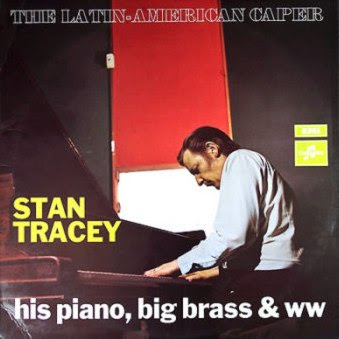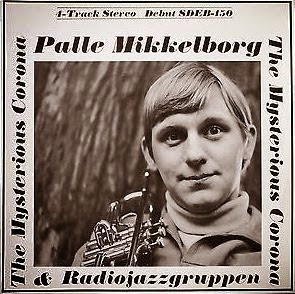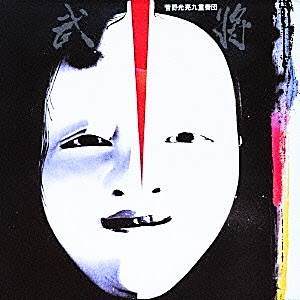STAN TRACEY - THE LATIN AMERICAN CAPER

Stan Tracey, his Piano, Big Brass & Woodwinds for Columbia UK from 1969.
Stan Tracey - Piano & Musical Director ;Kenny Baker, Derek Watkins, Eddie Blair, Les Condon - Trumpets ;Keith Christie, Maurice Pratt, Bobby Lambe - Trombones ;Chris Taylor, Roy Willox, Ray Swinfield - Flutes ;Ronnie Chamberlain, Don Rendell, Derek Collins - Clarinets ;Barry Morgan - Drums & LA Percussion ;Dennis Lopez, Stuart Gordon - LA Percussion ;Lennie Bush or Dave Green - Bass ;Alan Branscombe -Vibraphone & Marimba
Recorded at Lansdowne Studios in London on July 16/17 1968
Supervision - Denis Preston;Sleevenote - Peter Clayton;Engineer - Adrian Kerridge
Here's Peter Clayton's excellent sleeve notes :
Stan Tracey is one of those people who could go to a fancy dress ball in full klu klux clan regalia and still be instantly recognisable. I'm speaking figuratively, of course: for him to appear physically outlandish is unthinkable. You could set him down on London Bridge Station any weekday afternoon around 5.30 and lose him in the crowd. It is in the artistic sense that Stan's craggy, positive personality breaks through any attempt to disguise it.
Not that any too deliberate attempt has been made in the case of this, at first sight, uncharacteristic album, The sombrero and poncho were not intended as camouflage but as a stimulating splash of specialised colour to help Stan think himself into an unusual and indeed unlikely situation. the idea, in fact, was not to produce a Latin-American album by Stan Tracey, but a Stan Tracey album with Latin-American overtones. And since the whole project was in a sense an adventure the avuncular title of LATIN-AMERICAN CAPER at once suggested itself.
At the core of the music thus created is the Stan Tracey Trio - Stan on piano, Lennie Bush on bass and Barry Morgan, drums. With the addition of sundry Latin-American percussive noises and Alan Branscombe on vibes or marimba this is the small group which performs Because I Tell You So, Ouida and Obiah.
Another of the groups involved is the Stan Tracey Big Brass - a variant of the ten piece brass choir already heard on the Tracey-Bilk collaboration BLUE ACKER (Columbia TWO 230) and Stan's Ellingtonian tribute, WE LOVE YOU MADLY (Columbia SCX 6320). The Big Brass is featured on Capullito De Aleli, on One For Bo Bo and on What Else Can You Do With A Drum?
The third and perhaps most intriguing ensemble is what in score-readers' parlance is simply referred to as "WW" - or woodwind. From a front line of three flutes and three clarinets this combination produces the most satisfying of sounds, quite unlike anything that Stan has written before. If I say, for instance, that it has something of Gil Evans about it (especially on Come Out And Meet Me Tonight) it is only to convey an idea of its atmosphere. It is not like the writing of Gil Evans, but it's nearer than anything else. One For Sass and Bakiff are the other two titles by this particular group, which is also notable for having Don rendell amongst its clarinetists and solist on One For Sass, and Chris Taylor of the Philharmonia among the flutes. It is Chris who plays the opening theme of Come Out And Meet Me Tonight.
Stories go with some of the titles. What Else Can You Do With a Drum? is from Duke Ellington's least played suite - A Drum Is A Woman. (If Stan were the sort of man to believe in deification there's no doubt his musical diety would be Ellington!). Because I Tell You So is a Tracey original (even his titles bear his hallmark) and was once intended as a part of the WITH LOVE FROM JAZZ suite (Columbia SCX 6205) but somehow got left out. The Sass of One For Sass is Stan's daughter, Sarah. The woodwinds handle this one with the kind of forcefulness one doesn't normally associate with flutes and clarinets. Ouida is not a further excursion into English literature. (I doubt the novels of that curious Victorian authoress would stimulate even Stan's quirky musical mind into activity!). Capullito De Aleli, for Big Brass, shakers, bangers and scrapers, is the classic Noro Morales speciality.
Stan first came across Come Out And Meet Me Tonight on an Art Blakey album. There's fascinating voicing for woodwinds on this one. Obiah is something to do with black magic. I don't know what exactly, but it's a word much connected with the occult arts in Caribbean society. Bakiff is the old Juan Tizol number associated, like Tizol himself, with the Ellington orchestra. One For Bo Bo is the brother of One For Sass, Bo Bo being Stan's code name for his young son, Clark.
Despite protestations that he's not really a Latin-American man, Stan does seem to have been affected by the percussive nature of the music. I've seldom heard him so crisply reminding us that the piano is, after all, a percussion instrument. Obiah is probably the track that points it up most, but the driving effect is there even on a ballad like Because I Tell You So. For me it's the quality that makes the jazz piano the exciting thing it is. Fats Waller, Duke Ellington, Cecil Taylor and Thelonius Monk have all been aware of little levers working little hammers and haven't wasted their time trying to turn the instrument into a sort of keyboard trombone. It is this kind of attack, moreover, which helps generate the swing without which the whole point of jazz, Latin-tinged or otherwise, is lost.
First time out in blogland for this lp which has never made a reissue in any form. Even though Mr Tracey regards it as his "least favourite session of all time" it's still(for me if nobody else!).....
All killer no filler !


